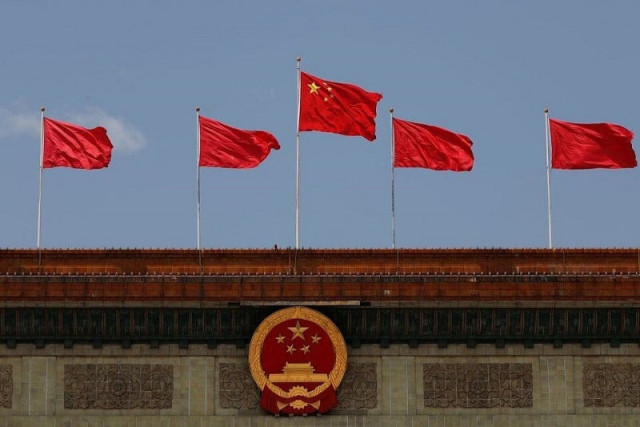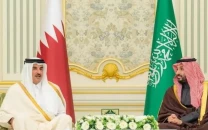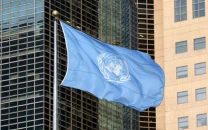SITUATIONER: Pragmatism takes center stage at China's ‘two sessions’
Amid global uncertainties, Chinese leadership articulates comprehensive vision of wide-ranging domestic, int'l issues

China finds itself amidst a pivotal week in its national political calendar as the 75th anniversary of the founding of the People’s Republic coincides with the convening of the National People’s Congress, an annual gathering that serves as the premier platform for the country’s leadership to set forth its agenda across various domains.
For over seven decades, the National People's Congress (NPC), the highest gathering of China’s political elite, including national legislators and political advisors, has provided the global community with an early preview into Beijing’s strategies in diplomacy, the economy, internal governance, and its evolving position in the global order. The 14th iteration of the NPC proved no different. Against a backdrop of global uncertainties, the Chinese leadership has articulated a comprehensive vision on a range of domestic and international issues, addressing both its local audience and the international community.
Presenting the annual report card, Chinese Premier Li Qiang emphasized the pressing ‘economic challenges’ by unveiling conservative growth objectives for the world’s second-largest economy. This move highlights the nation’s determination to navigate through the current period of economic turbulence, which has somewhat tempered its previously vibrant growth trajectory.
While Premier Li openly acknowledged the ‘many risks and hidden dangers’, he, with the poised demeanor typical of Chinese leadership, also asserted China’s ability to bounce back. Recent economic indicators corroborate this assertion. With a 5.2% growth rate, surpassing the 5.0% target set by former Premier Li Keqiang, China has already positioned itself as one of the top global performers in 2023. To meet this year’s growth target, Premier Li indicated that the central government would aim for a variety of steps, including a headline budget deficit of 3% of GDP. Additionally, there will be a slight increase in the quota for ‘special bonds’ issued by local governments, primarily allocated to infrastructure projects. Moreover, the central government plans to sell $140 billion worth of long-term special bonds this year, with further issuance expected in the coming years.
Even as Washington and pundits alike may paint a grim picture of the $18 trillion economy, the ongoing People’s Congress reveals a discernible shift towards pragmatism within Beijing’s corridors of power. Despite international scrutiny and prognostications about China’s economic collapse, a closer examination of economic data, particularly in light of the details presented before the NPC, reveals a more resilient image of the nation, with the Chinese leadership committed to economic pragmatism. While the streak of untrammeled growth may experience interruptions for some time, there are currently no signs indicating the demise of China’s economic prowess, at least not in the near future.
Rather than fixating our assessments of China’s economic health on short-term fluctuations, it is essential to recognize the nation’s enduring capacity for long-term vision and strategic planning, implementing policies aimed at sustainable growth and development. The details unveiled at the NPC reinforce this commitment, with substantial investments aimed at modernizing industries, increasing technology funding, and promoting emerging sectors.
It is noteworthy that initiatives aimed at bolstering domestic consumption, innovation, and addressing socioeconomic issues also highlight China’s proactive stance on economic reform. Moreover, policies geared towards technological advancement and industrial enhancement affirm Beijing’s dedication to promoting innovation-driven growth in the future.
In many ways, the agenda presented at the 14th NPC indicates that the central leadership is already configuring China for challenges beyond the current decade. Describing the global environment as ‘more complex, severe, and uncertain’, Premier Li also indicated that it was important for China to attain ‘greater self-reliance and strength’ in science, technology – particularly Artificial Intelligence. So far, the most significant shift unveiled at the NPC has been an enhanced focus on investment in technology and developing emerging industries, with R&D spending set to rise by 10%. It is this capacity to adapt and pursue long-term objectives that has consistently propelled China's transformation from a fledgling economy in the 1980s to a global powerhouse today. Despite facing numerous challenges along the way, including the recent global pandemic, the country has always defied naysayers and emerged stronger each time.
It is important to note that over the decades, China’s leaders have also implemented policies aimed at sustainable growth and development, enabling the country to weather economic downturns more effectively than many other nations. The Covid-19 pandemic, which many predicted would deal a fatal blow to China’s economy, was the most recent litmus test. This long-term perspective has allowed the country to prioritize investments in key sectors, such as infrastructure, technology and education, which contribute to its overall economic resilience.
Furthermore, Beijing has demonstrated a willingness to adapt its economic policies in response to changing global dynamics, including shifting consumer preferences, technological advancements, and geopolitical shifts. This adaptability enables China to capitalize on emerging opportunities and mitigate potential risks. Another key aspect that cements China’s chances of full recovery is that despite facing criticism and geopolitical tensions, the country remains deeply interconnected with the rest of the world through trade, investment, and supply chains. This interconnectedness provides China with access to diverse markets and resources, contributing to its economic resilience and a solid chance for recovery from any temporary downturn. And as history has shown time and again, betting against Beijing’s economic recovery is a risky proposition.
Geopolitics and China
Amidst the global turmoil plaguing regions from the Middle East to Ukraine, China emerges as an advocate for stability, offering a measured and consistent approach that sharply contrasts with the United States, its main rival.
On the sidelines of the annual legislative session, Chinese Foreign Minister Wang Yi signaled Beijing’s intent for a recalibration of its relationship with Washington, emphasizing mutual respect, peaceful coexistence, and cooperation. This sets the tone for the ongoing power rivalry between the two giants.
Although not officially part of the National People's Congress declarations, Wang Yi's recent remarks shed light on Beijing's proactive approach to addressing pressing international issues through diplomacy and collaboration. Among these challenges is the ongoing Israeli-Palestinian conflict. Wang Yi's vocal support for Palestine’s full UN membership further emphasizes Beijing’s steadfast advocacy for Palestinian rights and its pursuit of a just and lasting resolution to the Gaza conflict. By endorsing an immediate ceasefire and supporting a comprehensive two-state solution, China has reaffirmed its belief in multilateralism and dialogue as pathways to sustainable peace.
Moreover, Wang Yi’s commentary on the Ukraine crisis, once again, displays Beijing’s proactive stance on conflict resolution. Advocating for negotiations and a multilateral framework, China has called for an inclusive international peace conference recognized by all parties involved, rejecting unilateral actions or coercion as viable solutions.
China's policy of non-interference in global conflicts has been pivotal in promoting economic growth and stability domestically. Unlike some Western powers, which often resort to military interventions and geopolitical rivalries, China has adopted a pragmatic and non-confrontational stance in international relations. However, with the American presidential election intensifying rhetoric of toughness towards China, President Xi Jinping appears inclined to tread carefully to avoid direct confrontation with the United States. Premier Li’s recent remarks emphasize China’s opposition to hegemonic behavior and bullying tactics, with a subtle reference to Washington’s actions. His comments regarding Taiwan reflect Beijing’s firm stance against external interference while advocating for peaceful cross-strait relations.
Overall, China’s strategy of non-interference has yielded numerous benefits, including prolonged economic growth and enhanced credibility in the global order, particularly in the global south. In the long run, this approach to geopolitics, marked by balance, pragmatism, and cooperation, offers a promising path towards a more stable world.
Military budget
While the announced 7.2% increase in the military budget raised many eyebrows across Western capitals, it is essential to contextualize Beijing’s position within its highly confrontational relationship with its arch-rival, the United States. Last year, the US, under Biden, boasted the largest peacetime defense budget request at a staggering $886 billion. Unlike the US military, the People's Liberation Army has not been deployed on foreign territories and is not actively engaged in any conflicts or occupation of another country. Criticism of China’s official military expenditure, which appears to be on par with last year’s pace, is somewhat biased. While Beijing’s official military spending, as a share of GDP, remains higher than Japan and Germany, it is significantly lower than that of the US.
Premature obituaries
While the National People's Congress deliberates on shaping China's future direction, Western narratives are rife with dire prognostications about the $18 trillion economy. From forecasting a grim future for Beijing to describing its economic slowdown as a ticking time bomb, a plethora of pessimistic scenarios have inundated the Western discourse on China. However, considering Beijing's track record and its ability to bounce back from adversity, premature obituaries for the Chinese economy appear both biased and unfounded.
Reflecting on the past four decades, during which Deng Xiaoping spearheaded market reforms, China’s economic landscape has undergone a remarkable transformation. In 1980, China’s economy was a mere 11% the size of the United States, whereas recent IMF estimates depict it as over 70% as large. Despite navigating through crises like the Asian financial downturn in 1997-1998 and the global recession in 2008-2009, China has emerged as a global economic powerhouse. Millions of Chinese citizens have risen out of poverty, and the nation has emerged as a leader in technology, particularly in Electric Vehicles, surpassing even pioneers like Japan.
Considering all of this, Arvind Subramanian's views on China’s economy come to mind. Over a decade ago, in his book 'Living in the Shadow of China's Economic Dominance', the former Indian government economic advisor forecasted that the Chinese economy would surpass America's by the decade's end. As we approach 2030, it seems that Subramanian's prediction is on track. Despite the challenges, he anticipates that China will continue to outpace the US in growth for the remainder of the decade. Indeed, in just 75 years, China has achieved what many consider the greatest economic miracle in human history.



















COMMENTS
Comments are moderated and generally will be posted if they are on-topic and not abusive.
For more information, please see our Comments FAQ